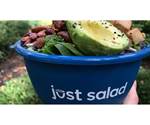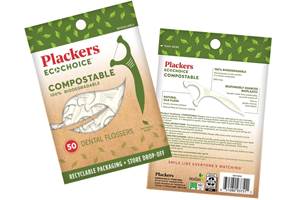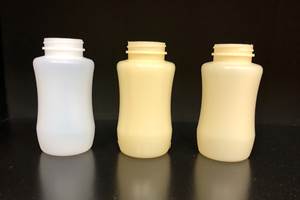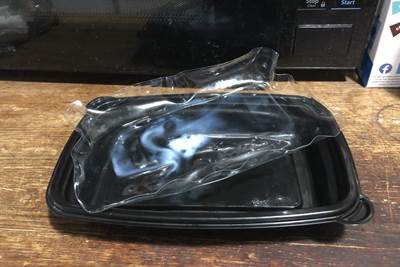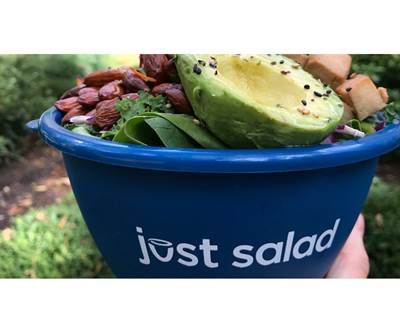Plastics in the Home (Mine), Continued
What to do with a growing stock of reusable plastic shopping bags and a pile of plastic cutlery packs from restaurant takeout?
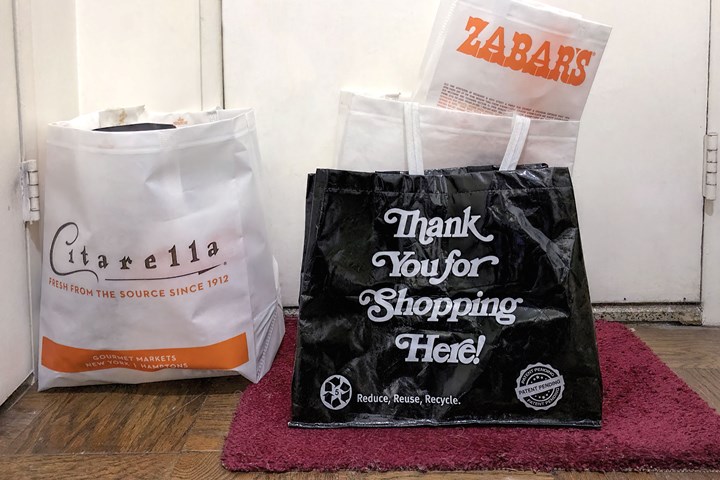
‘Single-use’ plastic shopping bags were outlawed, so now I have all these lovely heavy-duty reusable ones piling up. (Photo: Matthew Naitove)
I’ve written here before about my own wrestling with the quandaries of consumer recycling – painstakingly sorting plastics that may end up in landfills anyway, filling my cabinets with highly reusable “single-use” packaging items, dealing with selective plastics bans in my community, and so on. But the landscape keeps changing, and two plastic items in particular have made increasing demands on my attention lately.
One is a byproduct of the plastic shopping-bag ban imposed on grocery stores in New York City, where I live. (“If you call that living” – yeah, I’ve heard that one already.) The upshot is that I am stumbling over collections of reusable bags made of heavy-duty nonwoven PP. I say “stumbling” because I stock them by my apartment door so I’ll (hopefully) remember to take one with me when I go out to shop. Otherwise, I’ll pay hefty fee for another one of these bags I don’t need to carry my purchases home. These bags are very well engineered and reasonably attractive—I can’t just throw them out with the trash. Which leads to predictable results.
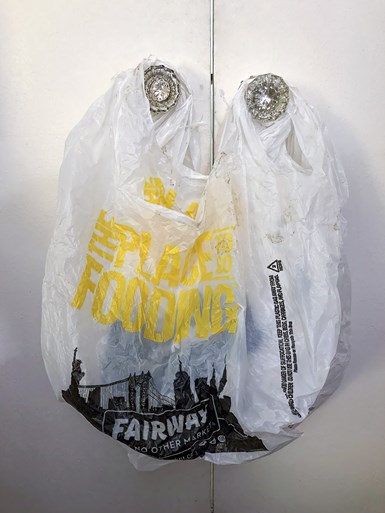
These ‘single-use’ plastic carryout bags are still legal in my community (for now) and are therefore a precious commodity for a range of household uses.
Photo: Matthew Naitove
And that’s a separate issue from the billowing stash of old-fashioned, featherweight HDPE carryout bags still allowed for other retail purchases, and which have become a valuable commodity for various household purposes. (I don’t have a dog to pick up after, but there are plenty of other applications.) Those bags are mostly quite small, so I’m also paying good money for relatively heavyweight trash liners in which to send my non-recyclable household waste directly landfill. I used to reuse larger lightweight HDPE carryout bags for that purpose – but no longer, thanks to the wisdom of our City Council.
Item Number Two: Living in a city with restaurants on nearly every block, I bring home a lot of carryout dinners. Many of them come with packages of plastic cutlery, sometimes two or three at a time. They’re generally molded in HDPE or PP, though occasionally I get some cutlery of PLA or compostable starch-filled polyolefin. The PLA versions are very handsome, identifiable by their creamy off-white color, distinctive feel, and higher stiffness than polyolefin counterparts.
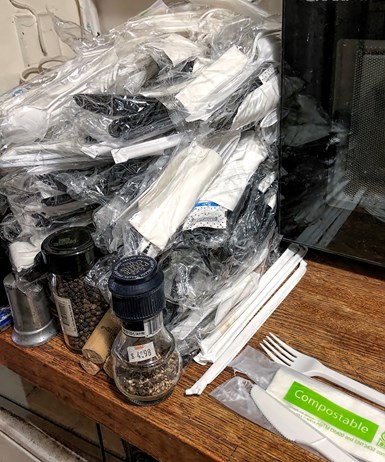
What about all these plastic cutlery packs that come with restaurant carryout orders? They’re generally recyclable; some are compostable. No way I can use them up as fast as they come in.
Photo: Matthew Naitove
I make an effort to use these packs for miscellaneous light-duty purposes—spreading butter on toast, fishing olives out of a jar, spooning out condiments—then I recycle them, of course. But I can’t keep up with the accumulation of these packs. I’ve filled up a large shopping bag with them, but they’ve overflowed into a tipping pile on my counter.
I suppose I could recycle them unused—but that would require tearing open the film wrappers on innumerable packs and removing the paper napkins and tiny portions of salt and pepper – a ridiculous waste of time, even for an obsessive like me. I suppose I could donate them to a soup kitchen, if I can locate one near me. I’ll have to do some research. Sigh.
Related Content
How to Optimize Injection Molding of PHA and PHA/PLA Blends
Here are processing guidelines aimed at both getting the PHA resin into the process without degrading it, and reducing residence time at melt temperatures.
Read MoreNPE2024 Wrap-Up: Sustainability Dominates Show Floor News
Across all process types, sustainability was a big theme at NPE2024. But there was plenty to see in automation and artificial intelligence as well.
Read MoreHow to Extrusion Blow Mold PHA/PLA Blends
You need to pay attention to the inherent characteristics of biopolymers PHA/PLA materials when setting process parameters to realize better and more consistent outcomes.
Read MoreInside the Florida Recycler Taking on NPE’s 100% Scrap Reuse Goal
Hundreds of tons of demonstration products will be created this week. Commercial Plastics Recycling is striving to recycle ALL of it.
Read MoreRead Next
My Top Three Prizes for Most Irritating Plastic Packaging
More than most consumers, I feel really let down when plastic packaging isn’t user-friendly. Unlike most frustrated consumers, I can diagnose pretty well what went wrong in manufacturing or design of the failed product.
Read MoreBan ‘Single-Use’ Plastics? What If They’re Not ‘Single’ Use?
Today’s high-quality bowls and trays for deli foods and restaurant carry-out should not be branded with the despised “single-use” label.
Read MoreMaking the Circular Economy a Reality
Driven by brand owner demands and new worldwide legislation, the entire supply chain is working toward the shift to circularity, with some evidence the circular economy has already begun.
Read More


